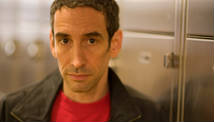Jan 16, 2013 6:40pm
In an interview with ABC News this evening, NRA President David Keene said the gun-rights lobby is aggressively preparing for “battle” with the White House and Congress over President Obama’s sweeping new proposals to curb gun violence.
Keene criticized Obama’s announcement today, surrounded by four children from around the country, for “using kids to advance an ideological agenda.” And he expressed cautious confidence that few of the legislative measures would ultimately pass.
“It’s going to be very tough for the president to accomplish some of these things, but that doesn’t mean he can’t do it if he really turns it on,” Keene told ABC.
“All bets are off when a president really wants to go to war with you,” he said. “We’re gonna be there and we’re gonna fight it.”
Keene said passage of the 1994 assault weapons ban remains fresh in the minds of NRA leaders, noting that initial widespread congressional opposition gradually gave way to a narrow margin in favor, thanks in part to pressure from then-President Bill Clinton.
NRA members would hold accountable any politicians who “sell them out to some pie-in-the-sky scheme such as the president is proposing,” he said.
The group launched a new “Stand and Fight” advocacy campaign Tuesday night, opposing Obama’s gun control measures, anchored by a controversial new TV ad that began airing online and on the Sportsman Channel.
The ad calls President Obama an “elitist hypocrite” for sending his daughters to a private school with armed guards while questioning whether all other U.S. schools should have the same security measures. The White House blasted the ad as “repugnant and cowardly.”
“When the question is the protection of children, which is what this is all about… it’s perfectly legitimate to ask why some children should be protected and other children should not be protected,” Keene said, defending the ad.
“We were not talking about the president’s kids. We were talking about an elite class who criticizes others in their desire to be safe while making sure that they and their families and their children are always protected.
“We’re not talking about the Secret Service protection the president’s children enjoy — they ought to have that wherever they go,” he added.
Keene also ribbed Obama for using children as “props” for his announcement: “We didn’t line them up on a stage and pat them on the shoulder while we were urging somebody to take our position,” he said.
The NRA has acknowledged some areas of common ground for curbing gun violence included the Obama proposal — namely beefed up resources for mental health care, better background check data and increased presence of school resource officers (police) at public schools.
But Keene said many of those steps were just “fig leaves.”
“What the president did is say … ‘I care about armed security.’ He can check off that box on the Gallup polls. He can say to the people concerned about it, ‘It’s part of my package.’ … He said the problem of severely, mentally ill — we’re going to study it.”
Obama called for federal aid to states for the hiring of up to 1,000 new resource officers and school counselors. Currently, there are armed resource officers at 28,000 U.S. schools.
“That’s a drop in the ocean in terms of the problem,” Keene said. “It’s simply a fig leaf so he can pursue an anti-gun agenda. It has less to do with security and more to do with gun.”














